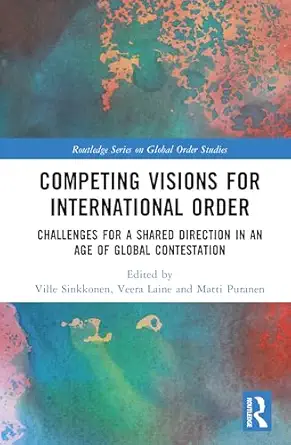
Competing Visions for International Order: Challenges for a Shared Direction in an Age of Global Contestation ( Routledge Series on Global Order Studies)
Author(s): Ville Sinkkonen (Editor), Veera Laine (Editor), Matti Puranen (Editor)
- Publisher: Routledge
- Publication Date: October 16, 2025
- Edition: 1st
- Language: English
- Print length: 230 pages
- ISBN-10: 1032912715
- ISBN-13: 9781032912714
Book Description
This book explores the international ordering visions of key global and regional powers in the international system from 2014 onwards.
Using a fourfold analytical framework based on the distributional, normative, institutional, and temporal dimensions of the visions propagated by the relevant political elites in the states/actors in question, the book addresses the ultimate question in international relations for the coming decades: To what extent can the visions pushed forward by the leading powers of the world be reconciled to arrive at a shared direction for international order writ large? The book’s analysis also offers normative prescriptions on how to avoid a tragic race to the bottom – a fragmented world of competing orders where states are unable to address shared global crises and challenges such as pandemics, cross-border crime, climate tragedies, and armed conflict. With this, it concludes by recognising the importance of agency as well as political imagination in navigating the crisis-ridden ordering moment of the international system.
This book will be of key interest to scholars and students in global order studies and governance, geopolitics, regional studies, foreign policy analysis as well as more broadly to international relations and security, political history, human geography, and policymakers.
Chapter 3 and Chapter 9 of this book is freely available as a downloadable Open Access PDF at http://www.taylorfrancis.comunder a Creative Commons Attribution (CC-BY) 4.0 International license.
Editorial Reviews
Review
“In this impressive collection of first-rate scholarship, authors and editors jointly demonstrate that ordering visions are an absolute necessity for an international order, but such visions vary across the time and space. As the transformation of the world politics is in full swing, knowing how actors foresee international order is essential. Sinkkonen, Laine and Puranen edited a fine collection which offers many crucial insights.”
Michal Onderco, Erasmus University Rotterdam, The Netherlands
“The overview of great power world visions offered by this brilliant and timely volume represents a much more stimulating and nuanced take on the current predicaments of global ordering than those proposed by, for example, studies of “strategic culture”. All the chapters of the book are of superb quality, and they meticulously apply a common analytical framework, creating a sense of coherence comparable to a monograph. Indeed, all serious students of world politics should reserve a spot for this volume in their bookshelves, be those real or virtual.”
Henri Vogt, University of Turku, Finland
"At a moment of profound transformation in the international order, this timely and incisive volume offers a comprehensive overview of competing global and regional visions. Anchored in a rigorous analytical framework and a comparative perspective, it delivers a nuanced exploration of how key actors are shaping―and contesting―the contours of the emerging world order. Essential reading for anyone seeking to navigate the ongoing debates about the future of the global order."
Sophie Vanhoonacker, Maastricht University, The Netherlands
"This timely and thoughtful volume addresses the increasingly rivalrous contest between the great powers over the proper rules, norms, institutions and organizations underpinning world order. The editors observe, "Traditionally, great powers have had an outsized role in re-ordering international relations during profound ruptures..." Precisely. The rapid rise of Chinese power and the revanchist assertion of Russian power has ruptured the longstanding consensus underpinning the U.S.-led liberal international order, inspiring America's rivals to advance alternative formulations. The vision that ultimately prevails will do so by successfully gaining influence over other major states - either by attraction or coercion. Competing Visions for International Order helps us understand great power visions of order, the preferences of other key countries, and the prospects for each great power to secure its vision as the one dominant over the future world order."
Thomas F. Lynch III, Distinguished Research Fellow at the National Defense University, USA, and editor of Strategic Assessment 2025: Great Power Competition at Mid Decade.
About the Author
Ville Sinkkonen is a leading researcher at the Finnish Institute of International Affairs, Finland.
Veera Laine is a senior researcher at the Ministry for Foreign Affairs of Finland.
Matti Puranen is an associate professor at the Finnish National Defence University, Finland.
 Wow! eBook
Wow! eBook

